Are you learning Chinese online?
And maybe planning a travel adventure to China?
Or do you want to be able to speak to Chinese people in your local community?
Even a little bit of Chinese will go a long way! Besides practical communication, learning some Chinese can make a big difference to your ability to make meaningful connections and experience Chinese culture.
Many of these common Chinese phrases are expressions I wish I’d learned much earlier. They're everyday phrases that you’ll hear in real life but might not find in any textbook.
If you already have some familiarity with Mandarin Chinese Pinyin and tones, you can go ahead and skip right to the phrases.
Otherwise, you’ll find some very useful info in the next section, so keep reading below! In either case, by the time you've finished this post, you'll have all the expressions you need to chat to a native Chinese person for the first time.
Pro Tip
By the way, if you want to learn Chinese fast and have fun, my top recommendation is Chinese Uncovered which teaches you through StoryLearning®.
With Chinese Uncovered you’ll use my unique StoryLearning® method to learn Chinese through story… not rules.
It’s as fun as it is effective.
If you’re ready to get started, click here for a 7-day FREE trial.
What Do You Need To Know About Chinese Pronunciation?

First, what do you need to know about Chinese pronunciation? For each phrase in this article, you’ll see there are a few parts.
Here’s the first phrase as an example:
- 你好!Nǐhǎo! – Hello!
- (Nee how)
Let’s break that down.
- First, you have the written form: the Chinese characters. 你好!
- Can’t read Chinese yet? No problem! Next to the characters, you’ll see a pronunciation guide.
- This is written according to a standardised system called Pinyin. That’s the Nǐhǎo part.
- Next, you have the English translation, plus any usage tips you might need to know.
- Finally, you’ll see a rough pronunciation guide based on English sounds – here it’s (Nee how). It’ll help if you want the basics super quick – however, it’s very approximate!
Many sounds in Chinese, particularly consonants, have no exact equivalent in English. That’s why Pinyin exists – to give a reliable pronunciation guide for learners.
I highly recommend familiarising yourself with Pinyin and the Chinese sounds it represents. It’ll help you so much in sounding more like a native speaker, and is essential if you want to progress past the basics.
Check out this table to listen to the sound of any word in Pinyin.
What Are Chinese Tones?

You may have noticed some markings on the vowel sounds in the Pinyin example above: Nǐhǎo. These represent the “tone” of each syllable.
Spoken Chinese is a tonal language.
This means that changes in your voice pitch while pronouncing a vowel sound form part of the meaning of a word. So, even if two words sound exactly the same except for the tone, a different tone = a different meaning.
There are 5 (-ish) tones in Mandarin – 4 main tones plus a de-emphasized “neutral” tone.
The tone markings in Pinyin visually represent the pitch contour that your voice makes when pronouncing the vowel. Here are the tones and how they are written:
- 1st tone = flat tone mā (or ma1)
- 2nd tone = rising tone má (or ma2)
- 3rd tone = falling-rising tone mǎ (or ma3)
- 4th tone = falling tone mà (or ma4)
- 5th tone = neutral tone ma (or ma5 or ma0)
Check out this post for more info on how to master Chinese tones.
Let's Get Talking Chinese
Ok, now that we’ve covered the pronunciation basics – let’s get talking!
Here are the categories of phrases that you will learn below:
- Greetings & small talk
- Getting to know you
- Being polite
- “I don’t understand!”
- Asking for directions
- Transport in China
- Eating out
- Shopping
- Numbers
- Solving problems
- Special occasions
- Saying goodbye
Common Chinese Phrases To Greet People

The backbone of social interactions – we all need greetings to start off a conversation right!
- #1 你好!Nǐhǎo – Hello!
- (Nee haow)
- #2 你好吗?Nǐhǎo ma? – How are you?
- (Nee haow ma)
- #3 很好 Hěn hǎo – Good
- (Hun haow)
- #4 还好 Hái hǎo – Pretty good
- (Hi haow)
- #5 不太好 Bù tài hǎo – Not so good
- (Boo tye haow)
- #6 早上好 Zǎoshang hǎo – Good morning
- (Dzow shung haow)
- #7 晚上好 Wǎnshang hǎo – Good evening
- (Wun shung haow)
- #8 晚安 Wǎn’ān – Good night
- (Wun-un)
Common Chinese Phrases For Getting To Know People

If you’re visiting China, you’ll generally find people are very friendly and not shy about asking questions! Here are some basics to help you connect with people you meet.
Pronunciation note: in this guide, the “or” sound represents the vowel sound in the English word “or,” but without an audible “r” sound at the end. In other words, the way it typically sounds in a British accent, rather than an American one.
If in doubt, check the Pinyin and go have a listen!
- #9 你叫什么名字?Nǐ jiào shénme míngzi? – What’s your name? (Informal)
- (Nee jyaow shun muh ming dzrr)
- #10 我叫__ Wǒ jiào__ – My name is…
- (Wor jyaow..)
- #11 您贵姓?Nín guìxìng? – What is your surname? (Formal)
- (Neen gway shing)
- #12 我姓__ Wǒ xìng__ – My surname is…
- (Wor shing)
- #13 你多大?Nǐ duōdà? – How old are you?
- (Nee dwor da)
- #14 我三十岁 Wǒ sānshí suì – I’m thirty (years old)
- (Wor sun shrr sway)
- #15 你来自哪里?Nǐ láizì nǎli? – Where do you come from?
- (Nee lye dzrr na lee)
- #16 我来自中国 Wǒ láizì zhōngguó – I come from China
- (Wor lye dzrr jong gwor)
- #17 你是哪国人?– Nǐ shì nǎ guó rén? – Which country are you from?
- (Nee shrr na gwor run)
- #18 我是中国人 Wǒ shì zhōngguó rén – I’m Chinese (literally, “I’m a Chinese person”)
- (Wor shrr jong gwor run)
- #19 我是外国人 Wǒ shì wàiguó rén – I’m a foreigner
- (Wor shrr wye gwor run)
- #20 老外 Lǎowài – Foreigner (a common slang term!)
- (Laow wye)
- #21 很高兴认识你 Hěn gāoxìng rènshi nǐ – Nice to meet you
- (Hun gaow shing run shrr nee)
Pro Tip
You usually use this last phrase when saying goodbye to someone after meeting them for the first time, rather than immediately after being introduced.
If you’re visiting China, your home country is quite likely to come up in conversation – find the Chinese name of your country here!
Common Chinese Phrases For Being Polite
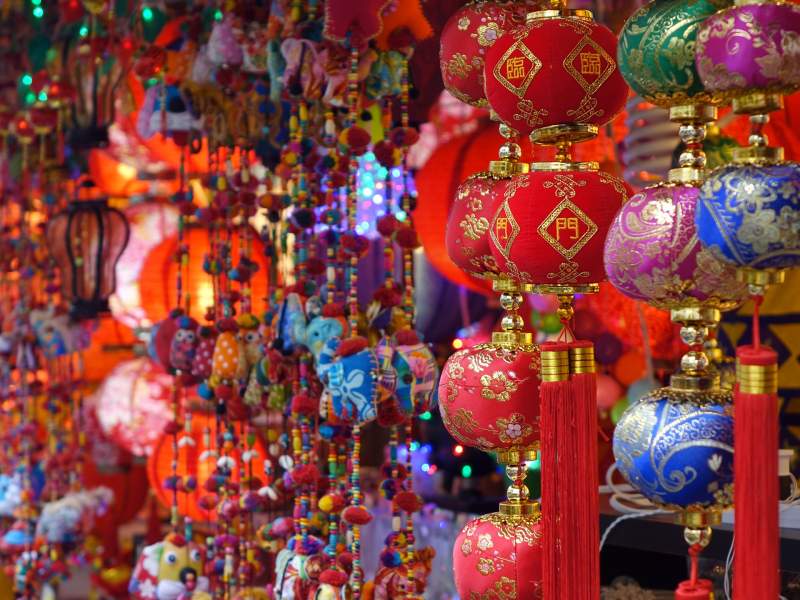
As humans, we’re generally out to make a good impression – here’s some help on that front!
Even if you don’t have much vocabulary yet, these words are bound to help your conversations go more smoothly.
- #22 谢谢! Xièxiè! – Thank you!
- (Shyeah shyeah) (Pronunciation tip: the “x” sound in Chinese is really somewhere in between “s” and “sh” in English.)
- #23 非常感谢! Fēicháng gǎnxiè! – Thank you so much!
- (Fay chung gun shyeah)
- #24 不用谢 Bù yòng xiè – You’re welcome (literally, “no need for thanks”)
- (Boo yong shyeah)
- #25 不客气 Bù kèqì – You’re welcome (literally, “no need to be so polite”)
- (Boo kuh chee)
- #26 不好意思 Bù hǎoyìsi – Excuse me, sorry (To get attention, for getting past, for mild apologies)
- (Boo haow yee srr)
- #27 对不起 Duìbuqǐ – Sorry (A more emphatic apology)
- (Dway boo chee)
- #28 请问…? Qǐngwèn…? – Could I ask…? (A polite way to preface a question)
- (Cheeng wun)
- #29 麻烦你了Mǎfan nǐ le – Sorry to bother you
- (Ma fun nee luh)
- #30 没问题 Méi wèntí – No problem
- (May wun tee)
- #31 好的!Hǎo de! – OK!
- (Haow duh)
Common Chinese Phrases To Say: “I Don’t Understand!”
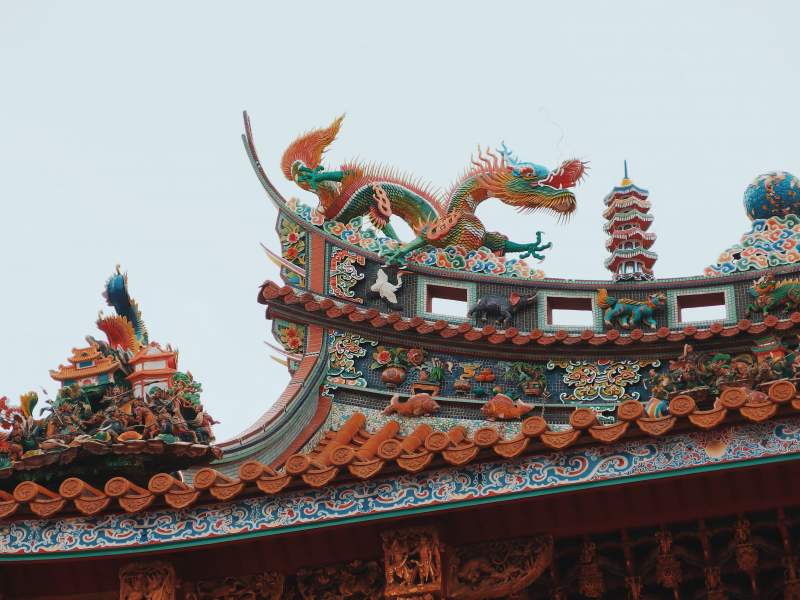
Ever been in a situation where you were listening to a native speaker and just kept nodding and smiling, when really had no idea what they were saying?
Here’s how to avoid that. The simplest way to get people to help you understand is to ask them!
- #32(你)听得懂吗?(Nǐ) tīngdedǒng ma? – Do you understand?
- (Nee teeng duh dong ma)
- #33(我)听得懂 (Wǒ) tīngdedǒng – I understand
- (Wor teeng duh dong)
- #34(我)听不懂!(Wǒ) tīngbudǒng – I don’t understand!
- (Wor teeng boo dong)
- #35(你)会说中文吗?(Nǐ) huì shuō zhōngwén ma? – Do you speak Chinese?
- (Nee hway shwor jong wun ma)
- #36(你)会说英文吗?(Nǐ) huì shuō yīngwén ma – Do you speak English?
- (Nee hway shwor yeeng wun ma)
- #37(我)不会说中文 (Wǒ) bù huì shuō zhōngwén – I don’t speak Chinese
- (Wor boo hway shwor jong wun)
- #38(我)会说 (Wǒ) huì shuō – Yes, I can speak it
- (Wor hway shwor)
- #39 可以说得慢一点吗?Kěyǐ shuō de màn yīdiǎn ma? – Could you speak more slowly?
- (Kuh yee shwor duh mun yee dyen ma)
- #40 __ 什么意思?__ shénme yìsi? – What does __ mean?
- (__shun muh yee srr)
- #41 __怎么说?__zěnme shuō? – How do you say __?
- (__dzun muh shwor)
- #42 (我)不知道 (Wǒ) bù zhīdao – I don’t know
- (Wor boo jrr daow)
Common Chinese Phrases For Asking For Directions

Sometimes asking the locals is still the best way to find something!
We’re so used to relying on map apps these days. But it pays to have some useful phrases up your sleeve. This is especially the case since Google services don’t work in mainland China.
Check out local alternative Baidu Maps for your navigation needs. Or better yet, keep reading for tips on navigating the old-fashioned way.
- #43 不好意思,可以问个路玛? Bù hǎoyìsi, kěyǐ wèn ge lù ma? – Excuse me, could I ask for some directions?
- (Boo haow yee srr, kuh yee wun guh loo ma)
- #44 到__怎么走?Dào ___ zěnme zǒu? – How do you get to the __?
- (Daow __ dzun muh dzoh)
- #45 __在哪儿?/ __在哪里?__zài nǎr?/__ zài nǎli – Where is the __?
- (__dzye narr/__dzye na lee) (Pro tip: the first variant, with an “r’’ sound, is more common in Beijing and northern China, while you’ll hear more of the second variant further south.)
- #46 __在那儿/__在那里 __zài nàr/__zài nàlǐ – The __ is over there.
- ( ____ zay naar / _____ zay naa-lee)
Pro tip: Tones are important here! Check out the above two examples:
- 哪儿nǎr means “Where?”
- while 那儿 nàr means “there!”
- #47 在这儿/在这里 Zài zhèr/Zài zhèlǐ – It’s here.
- (Dzye jurr/Dzye juh lee)
- #48 直走 Zhí zǒu – Go straight ahead
- (jrr dzoh)
- #49 右转 Yòu zhuǎn – Turn right
- (Yoh jwun)
- #50 左转 Zuǒ zhuǎn – Turn left
- (Dzwor jwun)
- #51 过马路 Guò mǎlù – Cross the road
- (Gwor ma loo)
- #52 我要去__ Wǒ yào qù__ – I want to go to __ (Also good for directing a taxi or buying a ticket)
- (Wor yaow choo)
Common Chinese Phrases To Talk About Transport
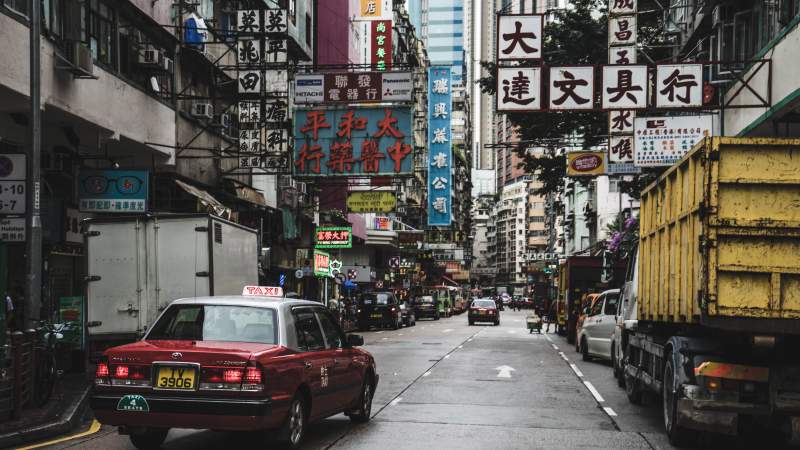
Most larger Chinese cities are very well connected with public transport of all kinds – though rush hour can get pretty crowded! There’s an extensive intercity train network, too.
- #53 一张到北京的票 Yī zhāng dào Běijīng de piào – One ticket to Beijing
- (Yee jung daow bay jeeng duh pyaow)
- #54 两张票 Liǎng zhāng piào – Two tickets
- (Lyung jung pyaow)
- #55 来回 Lái huí – Return/round-trip
- (Lye hway)
- #56 单程 Dān chéng – One-way
- (Dun chung)
- #57 机场 Jīchǎng – Airport
- (Jee chung)
- #58 火车站 Huǒchēzhàn – Train station
- (Hwor chuh jun)
- #59 地铁站 Dìtiězhàn – Metro/subway/underground station
- (Dee tyeah jun)
- #60 公交车站 Gōngjiāochēzhàn – Bus stop/station
- (Gong jyaow chuh jun)
- #61 出租车 Chūzūchē – Taxi
- (Choo dzoo chuh)
Common Chinese Phrases For Eating Out
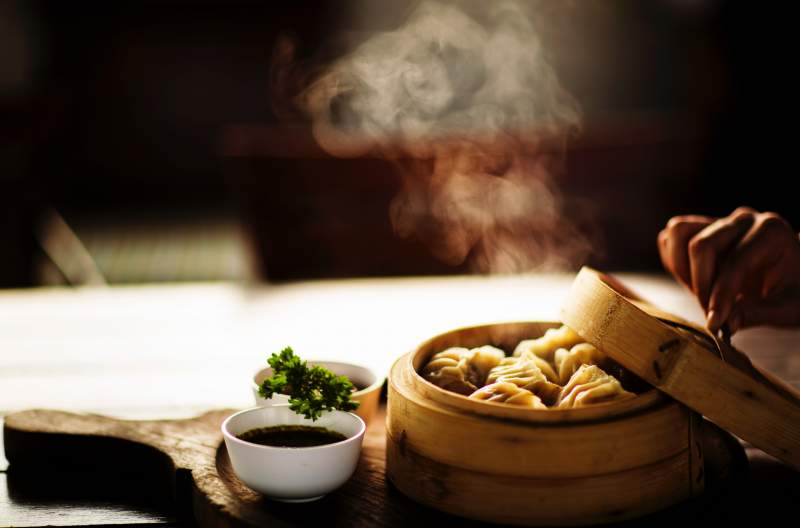
China has an incredibly rich and varied food culture.
Every region has its own cuisine, from the lighter, sweeter flavours of the south to the heavier, savoury sauces of the north.
Food-related vocabulary could be a whole post on its own, so let’s stick to some practical basics!
- #62 几位?Jǐwèi? – How many people?
- (Jee way)
- #63 一位 Yīwèi – One person (i.e. “a table for one”)
- (Yee way)
- #64 两位 Liǎngwèi – Two people
- (Lyung way)
- #65 我想看一下菜单 Wǒ xiǎng kàn yīxià càidān – I’d like to look at the menu
- (Wor shyung kun yee shyah tsay dun)
- #66 点菜Diǎn cài – (I’m/we’re) ready to order
- (Dyen tsye)
- #67 我要… Wǒ yào… – I’ll have…
- (Wor yaow)
- #68 服务员!Fúwùyuán! – Waiter!
- (Foo woo yoo-an)
- #69 买单!Mǎidān! – The bill, please!
- (Mye dun)
Pro Tip
In informal eateries in mainland China, short, efficient phrases like those above are the norm and are not considered impolite. In many places, diners simply call out fúwùyuán! to get the server’s attention.
Common Chinese Phrases For Shopping
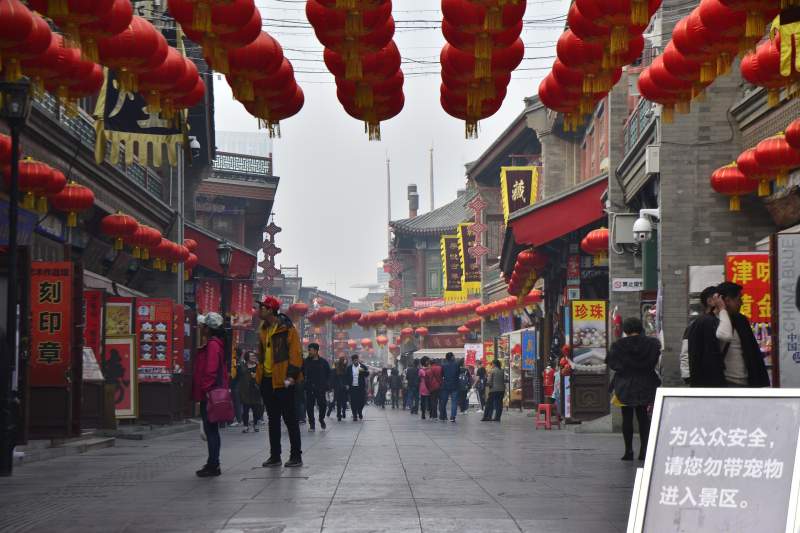
Shopping at Chinese markets can be a very lively experience, and haggling for a bargain is par for the course in markets and most small shops (not chain stores).
Ready to brush up your bargaining skills?
- #70 这个 Zhège – This one
- (Jay guh)
- #71 那个 Nàge – That one
- (Nay guh)
- #72 我要这个 Wǒyào zhège – I’ll take this one
- (Wor yaow jay guh)
- #73 我(不)喜欢那个 Wǒ (bù) xǐhuan nàge – I (don’t) like that one
- (Wor boo shee hwun nay guh)
- #74 多少钱?Duōshao qián? – How much is it?
- (Dwor shaow chyen)
- #75 太贵了!Tài guì le! – Too expensive!
- (Tye gway luh)
- #76 便宜一点儿!Piányi yīdiǎnr! – A bit cheaper! (To ask for a better price)
- (Pyen yee yee dyerr)
- #77 可以刷卡吗?Kěyǐ shuākǎ ma? – Can I use a card?
- (Kuh-yee shak-a ma?)
- #78 不要了! Bù yào le! – I don’t want it! (To stop someone hassling you to buy something)
- (Bu-YA-o-luh)
- #79 我看一下 Wǒ kàn yīxià – I’m just looking
- (Wor kun yee shyah)
Common Chinese Phrases: Numbers

Chinese numbers are very logical. See if you can spot the patterns from the following list:
- #80 零/〇 Líng – Zero
- (Leeng)
- #81 一 Yī – 1
- (Yee)
- #82 二 Èr – 2
- (Arr)
- #83 三 Sān – 3
- (Sun)
- #84 四 Sì – 4
- (Srr)
- #85 五 Wǔ – 5
- (Woo)
- #86 六 Liù – 6
- (Lyoh)
- #87 七 Qī – 7
- (Chee)
- #88 八 Bā – 8
- (Ba)
- #89 九 Jiǔ – 9
- (Jyoh)
- #90 十 Shí – 10
- (Shrr)
- #91 十一 Shíyī – 11
- (Shrr yee)
- #92 十二 Shí’èr – 12
- (Shrr arr)
- #93 二十 Èrshí – 20
- (Arr shrr)
- #94 二十一 Èrshíyī – 21
- (Arr shrr yee)
- #95 三十 Sānshí – 30
- (Sun shrr)
- #96 一百 Yībǎi – 100
- (Yee bye)
- #97 二百/两百 Èrbǎi/Liǎngbǎi – 200
- (Arr bye/Lyung bye)
- #98 五百 Wǔbǎi – 500
- (Woo bye)
- #99 六百零五 Liùbǎilíngwǔ – 605
- (Lyoh bye leeng woo)
- #100 七百五(十)Qībǎiwǔ(shí) – 750 (The “shí” is usually dropped)
- (Chee bye woo shrr)
- #101 八百一十五 Bābǎiyīshíwǔ – 815
- (Ba bye yee shrr wu)
- #102 九百八十七 Jiǔbǎibāshíqī – 987
- (Ju-bai ba-shi-ti)
- #103 一千 Yīqiān – 1000
- (Yee chyen)
More On Chinese Numbers
For more detail on the rules and a complete list of Chinese numbers from 0–1000, check out this article.
Bonus fact: In Chinese culture, the number 8, 八 (bā), is considered lucky, as it sounds a bit like the character 发 (fā) meaning “to prosper” or “become wealthy”.
People are often willing to pay big bucks to get phone numbers, apartment numbers or car license plates with a lot of number 8s in them!
The number 4, 四 (sì), on the other hand, is considered unlucky, as it sounds similar to the word for “death,” 死 (sǐ) – another excellent example of why tones are important!
Common Chinese Phrases For Solving Problems
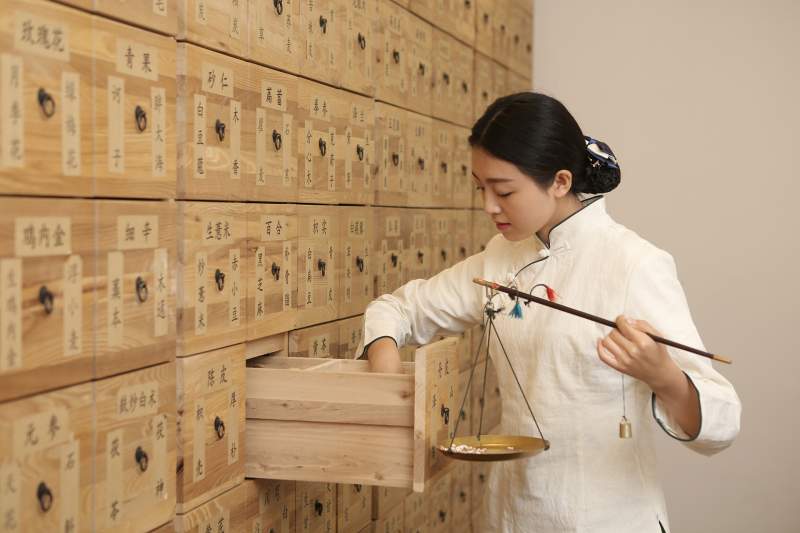
Speaking of bad luck, every traveller knows that things go wrong from time to time.
It pays to be prepared – supplement your best-laid plans with these contingency phrases.
- #104 可以帮个忙吗?Kěyǐ bāng ge máng ma? – Could you help me?
- (Kuh yee bung guh mung ma)
- #105 我迷路了Wǒ mílù le – I’m lost
- (Wor mee loo luh)
- #106 我的钱包丢了 Wǒ de qiánbāo diū le – My wallet is lost/missing
- (Wor duh chyen baow dyoh luh)
- #107 我要去医院 Wǒ yào qù yīyuàn – I need to go to the hospital
- (Wor yaow choo yee yoo-an)
- #108 我生病了 Wǒ shēngbìng le – I’m sick
- (Wor shung beeng luh)
- #109 我受伤了 Wǒ shòushāng le – I’m hurt/injured
- (Wor shoh shung luh)
- #110 这里疼 Zhèlǐ téng – It hurts here
- (Juh lee tung)
Pro Tip
Most doctors in China operate out of hospitals rather than private clinics. So you can head to a hospital for a regular doctor’s visit as well as in emergencies.
Common Chinese Phrases For Special Occasions

China has a rich traditional culture featuring many of its own festivals and celebrations, the most famous being Spring Festival or Chinese New Year.
Many Chinese people, at least in urban areas, also celebrate or at least give a passing nod to festivals from elsewhere, such as New Year (as in December 31st), Christmas and Valentine’s Day.
- #111 恭喜恭喜!Gōngxǐ gōngxǐ! – Congratulations!
- (Gong shee gong shee)
- #112 生日快乐!Shēngri kuàilè! – Happy Birthday!
- (Shung ruh kwye luh)
- #113 干杯!Gānbēi! – Cheers! (Literally, “dry cup!”)
- (Gun bay)
- #114 新年快乐!Xīnnián kuàilè! – Happy New Year! (For both Chinese New Year and the other one)
- (Shin nyen kwye luh)
- #115 恭喜发财!Gōngxǐ fācái! – May you be prosperous! (A traditional greeting at Chinese New Year)
- (Gong shee fa tsye)
- #116 祝你好运!Zhùnǐ hǎoyùn! – Good luck!
- (Joo nee haow yoo-un)
Common Chinese Phrases For Saying Goodbye

No one likes goodbyes – but there comes a time when we all must say them. Luckily, the word for “goodbye” in Chinese literally means “see you again!”
- #117 再见! Zàijiàn! – Goodbye!
- (Dzye jyen)
- #118 明天见! Míngtiān jiàn! – See you tomorrow!
- (Meeng tyen jyen)
- #119 下次见! Xiàcì jiàn! – See you next time!
- (Shyah tsrr jyen)
- #120 拜拜!Bǎibǎi! – Bye!
- (Bye bye)
- #121 一路平安!Yīlù píng’ān! – Safe travels!
- (Yee loo peeng un)
Sound Like A Native, Not A Chinese Textbook
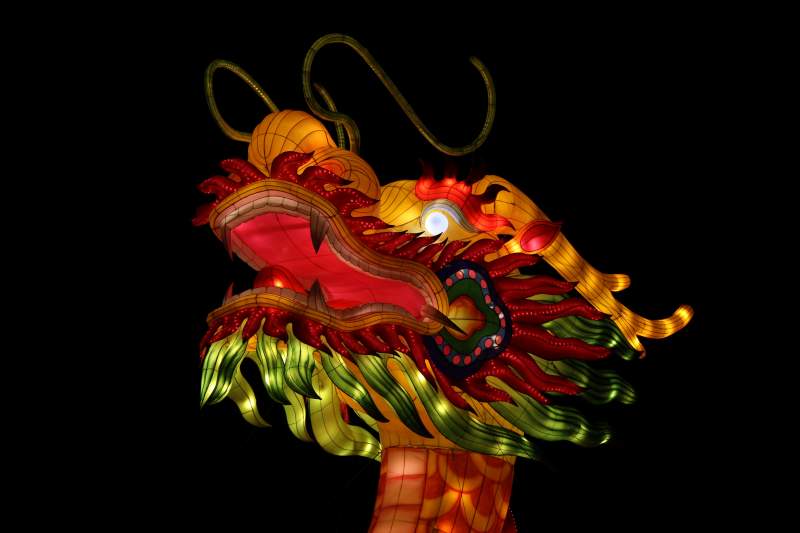
There you have it – your all-purpose guide to phrases that will help you through your first conversations in Mandarin.
From finding a bathroom to making a friend, these words and phrases will help you navigate life in Chinese, and not sound like a textbook while you do it.
As the oft-quoted Lao Zi once said, “the journey of a thousand miles begins with a single step.” These phrases will give you a solid stepping stone to start your own Chinese journey. 一路平安!








































